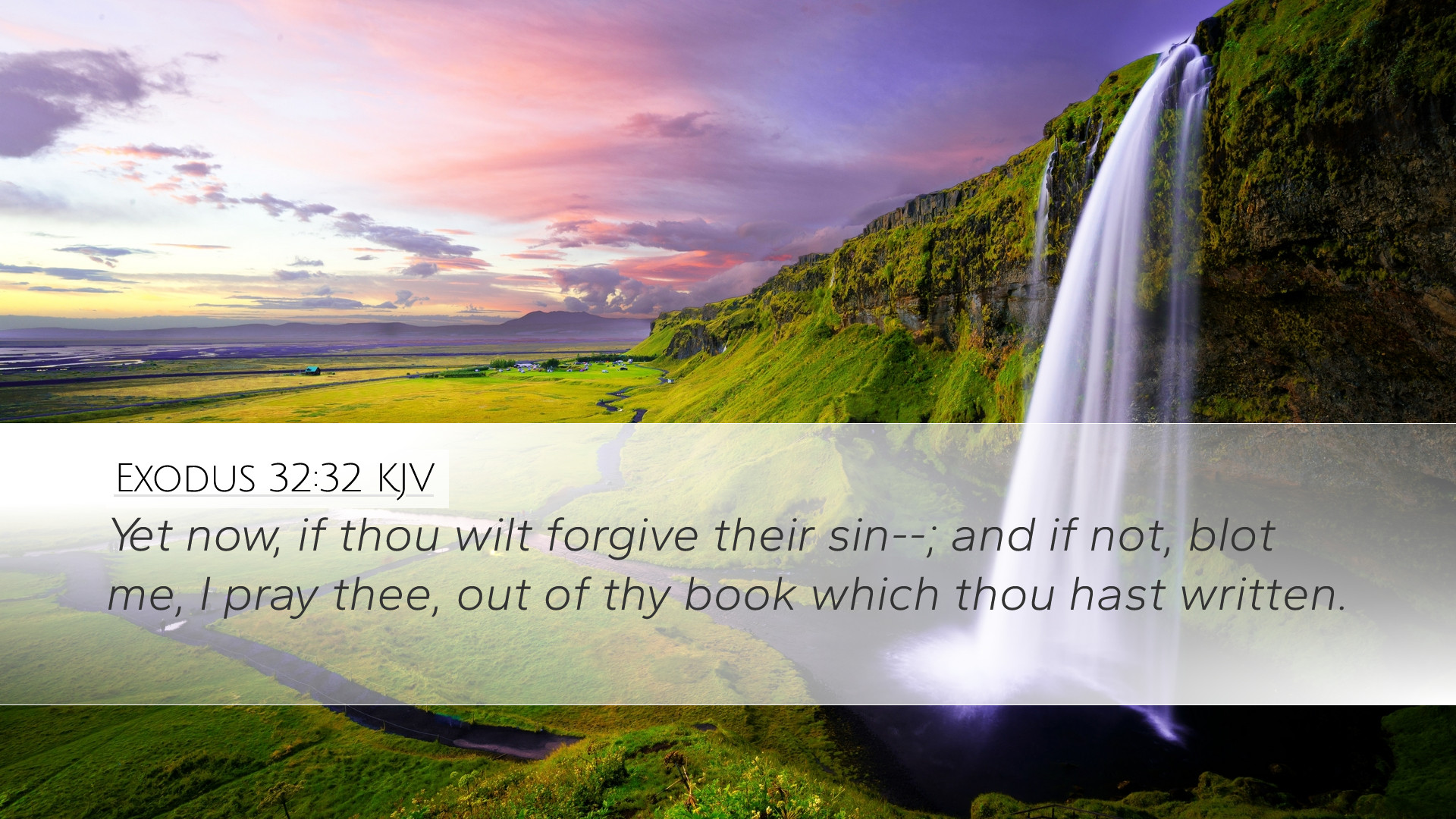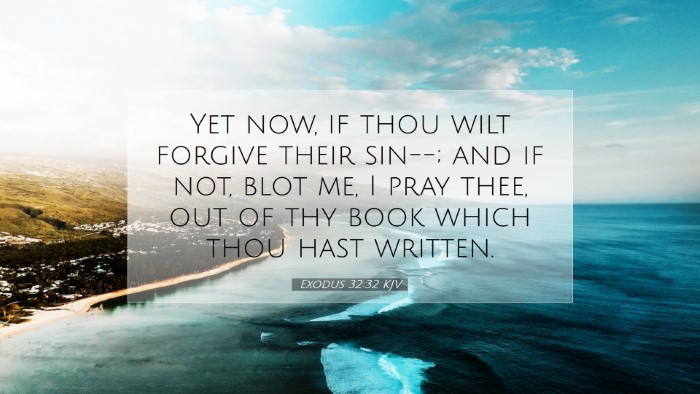Bible Commentary on Exodus 32:32
In Exodus 32:32, we encounter a profound moment of intercession by Moses, who pleads for the people of Israel in the face of their grievous sin against God. The verse states:
"But now, if you will forgive their sin, forgive it; but if not, please blot me out of your book that you have written."
This verse is rich in theological implications and reflects the character of Moses as a mediator, as well as the complexities of divine judgment and mercy.
Context of the Passage
The backdrop of Exodus 32 is the Israelites' idolatry, as they construct a golden calf in Moses' absence. This rebellion against God leads to severe consequences, prompting God to inform Moses of His wrath and intention to destroy the people. Moses’ response is pivotal, revealing his heart for the people he leads.
Moses as a Mediator
Moses stands between God and His people, a role that is crucial in understanding Exodus 32:32. He does not merely plead for their forgiveness but offers himself as a sacrifice if God refuses to pardon their sin.
- Albert Barnes notes the gravity of Moses' statement, emphasizing that he is willing to forfeit his own place in the divine plan for the sake of the people.
- Matthew Henry elaborates on this intercessory prayer, highlighting it as a reflection of Christ's ultimate sacrifice, where He became a substitute for sinners.
- Adam Clarke draws attention to the profound nature of such an offer, indicating that Moses’ desire to be blotted out demonstrates the depths of his commitment to God and the people.
Theological Insights
The plea of Moses raises significant questions about the nature of divine forgiveness and the concept of being blotted out of the book of life, a theme that resonates throughout Scripture.
- Divine Forgiveness: The possibility of forgiveness is central in this verse. Moses emphasizes the need for divine mercy, recognizing that rejection of sin leads to dire consequences.
- The Book of Life: The mention of 'blot me out of your book' introduces a profound theological concept. According to Henry, this may refer to the record of those destined for eternal life, a concept echoed in the New Testament (e.g., Philippians 4:3).
- Intercessory Prayer: Moses' role here serves as an illustration for believers today on the importance of intercession. As seen in the New Testament, Jesus Christ intercedes for us similarly (Romans 8:34).
The Nature of God's Justice and Mercy
The interplay of justice and mercy is a critical theme in this verse. God's response highlights the seriousness of sin while illustrating His overarching desire for repentance and restoration.
- Henry points out that God’s willingness to forgive emphasizes His mercy, while His demand for justice must still be acknowledged.
- Barnes explains that Moses' appeal to God reflects a deep understanding of the relationship between divine justice and mercy, whereby righteousness cannot simply overlook sin.
- Clarke suggests that although Moses offers to be blotted out, this does not suggest a literal possibility but rather underscores the gravity of sin and the seriousness of the plea.
Application for Today
For pastors, theologians, and students of the Word, the themes presented in Exodus 32:32 remain deeply relevant in contemporary Christian practice.
- Understanding Intercession: Followers of Christ are called to intercede for others. Just as Moses stood in the gap, believers are encouraged to pray for those who sin and to seek God's mercy on their behalf.
- Appreciating God's Holiness: This passage reinforces the importance of recognizing God's holiness and the appropriate response to sin. It challenges believers to consider the weight of disobedience against a holy God.
- Encouraging Repentance: The story prompts an encouragement toward repentance, as Moses' plea was not only a cry for mercy but an invitation for the people to turn back to God.
Conclusion
Exodus 32:32 encapsulates a profound theological moment in Scripture, blending the themes of sin, intercession, divine judgment, and mercy. It remains a powerful reminder of the mediator’s role in the story of redemption, shedding light on both the gravity of sin and the boundless nature of God's mercy.


